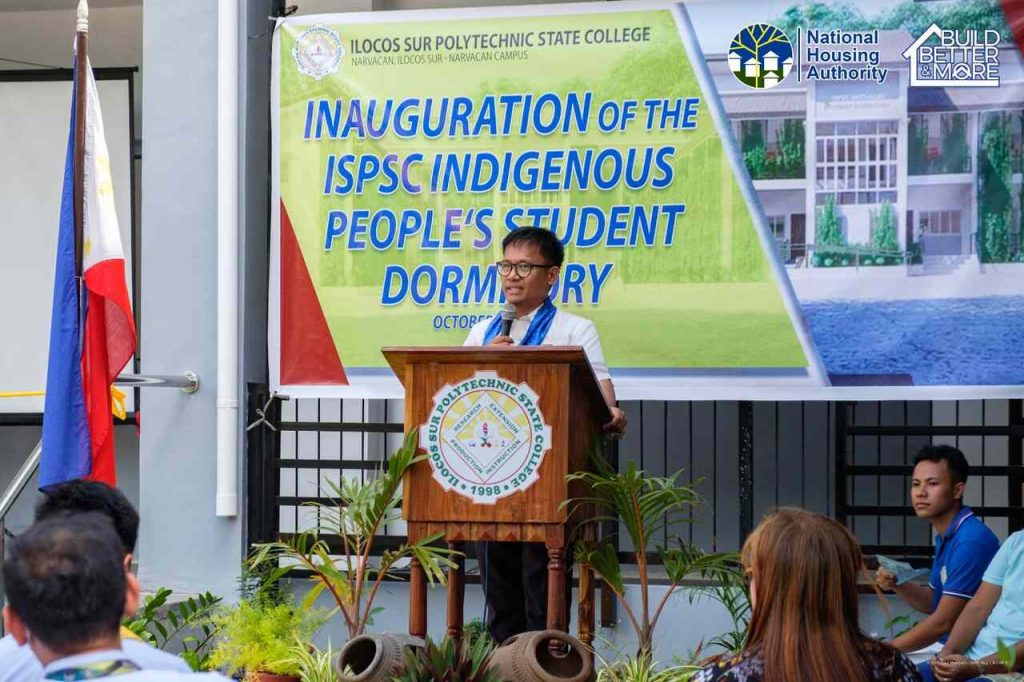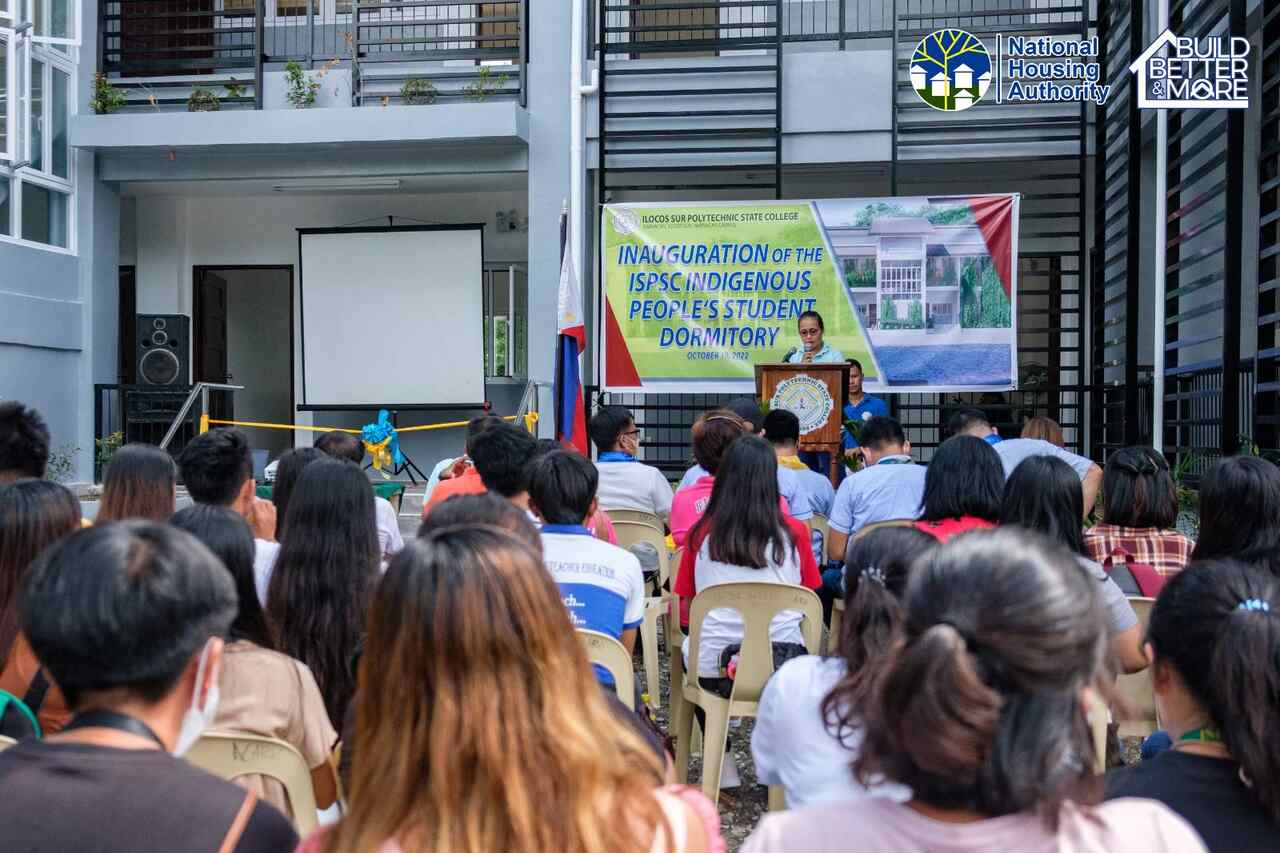The Housing Assistance Program for Indigenous Peoples (HAPIP-Student Dormitories) is a specialized housing initiative by the National Housing Authority (NHA) that provides safe, accessible, and culturally appropriate student dormitories for Indigenous Cultural Communities/Indigenous Peoples (ICCs/IPs) enrolled in State Universities and Colleges (SUCs). This program aims to support IP students who often come from remote ancestral domains and face challenges such as distance, transportation costs, and lack of accommodation near their schools. Through the construction of low-rise, fully equipped dormitories, the NHA seeks to empower Indigenous youth by giving them equal opportunities to pursue higher education in a supportive and inclusive environment.
The HAPIP-Student Dormitories program stems from the broader Housing Assistance Program for Indigenous Peoples (HAPIP), which was developed in line with Republic Act No. 8371 or the Indigenous Peoples’ Rights Act (IPRA) of 1997. This law mandates the government to recognize, protect, and promote the rights of Indigenous Peoples, including access to basic services like education and housing. Understanding how to apply for this program is crucial, especially for IP students and their families, as it opens doors to affordable housing solutions that not only address immediate needs but also contribute to long-term educational and socio-economic development for IP communities across the country. If you are an Indigenous Peoples (IP) student looking for affordable and secure housing while studying in a State University or College, then this guide will walk you through everything you need to know about how to apply for the HAPIP-Student Dormitories program, what it offers, who is eligible, and how it can make a difference in your life as an IP student.
What is the HAPIP-Student Dormitories Program for?

The Housing Assistance Program for Indigenous Peoples (HAPIP-Student Dormitories) is a project by the NHA designed to support Indigenous Cultural Communities/Indigenous Peoples (ICCs/IPs) by providing safe, student-friendly dormitory housing in State Universities and Colleges (SUCs). It improves access to education for IP students by offering convenient accommodation near or within educational institutions that are equipped with facilities that create a conducive learning environment and promote community-building among IP students.
Its main goal is to help IP students overcome challenges related to distance and accommodation as many students from remote or ancestral areas often face long commutes and high costs when studying in SUCs. With this program in place, these students can stay in affordable, purpose-built dormitories located within school compounds or near academic institutions while enjoying their academic journey while staying at a stable and culturally appropriate place to live while studying.
Features and Facilities
The dormitories developed under the HAPIP-Student Dormitories program are designed to meet the daily needs of IP students while maintaining a supportive community atmosphere. Their features typically include:
- Bedrooms
- Kitchen and mess hall
- Toilet and bath
- Study area
- Laundry area
- Low-rise building design suited to the local environment
One notable example is the Ilocos Sur Polytechnic State College (ISPSC) dormitory, which includes 12 well-equipped units, developed in partnership with the local government for the benefit of IP students in the region.
Another upcoming project in Pangasinan involves a two-storey dormitory within the compound of Pangasinan State University. It will include approximately 14 rooms with 64 beds for IP students, at a project cost of PHP 20 million.
Housing Design and Cultural Relevance
What sets HAPIP-student dormitories apart is the NHA’s focus on culturally appropriate housing solutions. Dormitories are either located in ancestral domains or on land owned by Local Government Units (LGUs) or SUCs, provided that these locations are acceptable to the concerned IP community.
NHA also takes into account the traditions, symbols, and practices of the IPs in the housing designs, helping students feel at home even while away from their communities.
Benefits
Here are some key benefits of the program for IP students:.
1. Improved Access to Higher Education
Students no longer have to travel long distances from remote areas to attend classes. The dormitories are located within or near campuses, allowing students to focus more on their studies.
2. Safe and Comfortable Living Spaces
The dormitories provide a secure and structured living environment equipped with all basic amenities, reducing the stress of finding and maintaining off-campus housing.
3. Supportive Community Living
Living with fellow IP students fosters a sense of belonging and community. This environment allows students to support each other academically and socially.
4. Culturally Sensitive Housing
Housing designs are developed in consultation with tribal leaders and community representatives to respect and integrate indigenous cultural traditions and values.
Who Can Apply for HAPIP-Student Dormitories?
The program is open to students who are:
- Members of Indigenous Cultural Communities/Indigenous Peoples (ICC/IP)
- Enrolled in a State University or College (SUC)
- In need of housing assistance due to distance or lack of affordable accommodation near the school
Applicants may also be assessed in coordination with the National Commission on Indigenous Peoples (NCIP) and local tribal leaders to verify eligibility.
Eligibility Criteria
To qualify for the HAPIP-Student Dormitory Program, applicants must meet the following criteria to be considered eligible beneficiaries and enjoy the program’s housing support benefits:
- Must be a member of an Indigenous Cultural Community/Indigenous Peoples (ICC/IP) group recognized by the National Commission on Indigenous Peoples (NCIP).
- Must be currently enrolled in a State University or College (SUC).
- Must come from remote or far-flung ancestral domains or areas with limited access to educational institutions.
- Must demonstrate need for safe, accessible, and affordable housing accommodation while pursuing higher education.
- Must be endorsed or validated by tribal leaders, the NCIP, or relevant local authorities.
- Preferably residing in a location where NHA-approved dormitory housing projects are being implemented or planned.
Required Documents
To apply for the HAPIP-Student Dormitory Program and access its housing benefits, eligible Indigenous Peoples (IP) student applicants must prepare and submit the following required documents:
- Certificate of Ancestral Domain or Certificate of Ancestral Land Title (CADT/CALT) or proof of membership in an Indigenous Cultural Community (ICC)/IP group
- Endorsement from the National Commission on Indigenous Peoples (NCIP) or concerned tribal leader or council
- Proof of Enrollment in a State University or College (SUC)
- Valid School ID or Certificate of Registration (COR)
- Barangay Clearance or Certificate of Residency
- Endorsement from the Local Government Unit (LGU) where the student resides or where the dormitory is located
- Photocopy of Birth Certificate
- Recent 2×2 ID Photo
How to Apply for the HAPIP-Student Dormitories Program
You simply need to follow these steps to apply:
Step 1: Coordinate with Your School or LGU
Check with your school administration or local government if a HAPIP-student dormitory is available or in development in your area. They may also guide you to the appropriate contact person.
Step 2: Verify Eligibility
Prepare documents that prove your identity as a member of an Indigenous Cultural Community and your current enrollment in a SUC. You may need certification from the NCIP and your school’s registrar.
Step 3: Submit an Application
Submit your application through your SUC, LGU, or directly to the nearest NHA regional office. Include required documents such as:
- Certificate of IP membership (from NCIP)
- Proof of enrollment
- Endorsement from your school or LGU
Step 4: Wait for Assessment and Approval
The NHA and its partner agencies will review your application. Approved applicants will be assigned to available dormitory units once construction or occupancy is open.
Where to Secure the Application Form
The HAPIP-Student Dormitory Program application form can be obtained directly from the nearest National Housing Authority (NHA) Regional or District Office or downloaded from the official NHA website. The application process is free of charge, and there are no fees required for form issuance or submission. Once all requirements are completed, applicants may submit their documents to the NHA regional office covering their location, and the processing timeline may take several weeks, depending on the volume of applications and the coordination needed with LGUs, NCIP, and partner institutions.
Success Stories and Ongoing Projects
Several projects under the HAPIP-Student Dormitories program have already been launched. For example, in Narvacan, Ilocos Sur, the NHA inaugurated a dormitory housing project for IP students in partnership with local leaders and the Ilocos Sur Polytechnic State College.
Another project is being developed in Asingan, Pangasinan, with a planned 64-bed capacity dormitory located within the Pangasinan State University compound.
These initiatives are part of NHA’s broader commitment to provide more inclusive housing assistance to Indigenous Peoples in the Philippines.
Other Housing Programs for IPs
Aside from student dormitories, HAPIP also includes housing projects for IP families through community-based housing programs. These housing solutions respect traditional architecture, land use, and communal living styles, and are often located within ancestral domains.
Video: HAPIP-Student Dormitories Program
The HAPIP-Student Dormitories Program is an important initiative that supports IP students by making higher education more accessible through affordable and well-designed housing. Whether you’re a student looking for dormitory space or an LGU seeking collaboration with the NHA, this program can make a lasting difference in improving educational outcomes for Indigenous communities across the Philippines. If you’re part of the IP community and studying at a State University or College, watch this video from NHA as this might be the housing assistance you’ve been looking for.
For inquiries or to learn more about how to apply for the HAPIP-Student Dormitories Program, you can reach out to the National Housing Authority (NHA).
